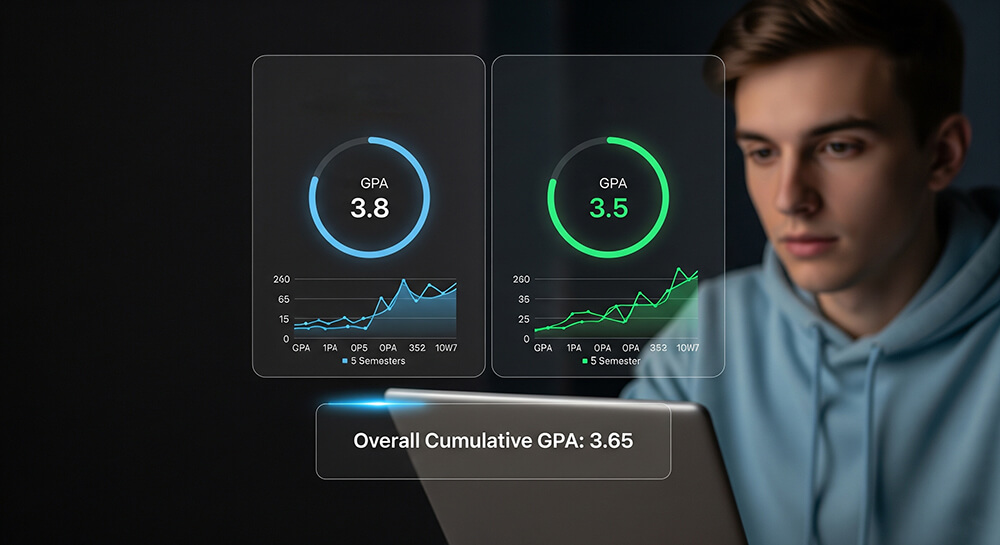Course-Filter by Department Code: A Guide
Calculating your Grade Point Average (GPA) is a key part of college. But what about the GPA for just your major? This is where filtering courses by department code helps. It lets you see your performance in the classes that matter most for your degree.
Key Takeaways
| Feature | Description | Benefit |
|---|---|---|
| What It Is | A tool that sorts your classes using department codes (like "CS" for Computer Science). | Lets you calculate your GPA for only your major-specific courses. |
| How It Works | It reads the prefix of each course on your transcript to identify its department. | Automatically separates major classes from electives and general education. |
| Why It's Useful | Provides a clear picture of your academic standing within your chosen field. | Helps with applications for jobs, internships, and graduate school. |
| Main Advantage | Saves time and reduces errors compared to calculating your major GPA by hand. | Gives you an accurate and quick way to track your progress. |
What Are Department Codes in College?
Department codes are short letter combinations at the start of a course name. For example, "MATH 101" means the course is from the Mathematics department. "ENGL 205" is an English class. These codes help organize the hundreds of classes a school offers. They tell you which academic department teaches the course. This simple system is the foundation for filtering your classes. Understanding this helps you use a college GPA calculator more effectively. A good how to calculate GPA guide will explain how these codes fit into the bigger picture.
How Filtering Helps Your Major GPA
Your major GPA shows how well you are doing in your specific field of study. It often matters more to employers and grad schools than your overall GPA. To find it, you only include courses from your major's department. A course filter does this for you automatically. It looks at your transcript and pulls out only the classes with the right department code. This saves you from sorting through your classes one by one. Using a cumulative GPA calculator is great for your overall score, but filtering is needed for your major-specific grade on www.thegpacalculator.com.
Handling Complex Degrees with Filters
Some students pursue more than one field of study. A course filter is very helpful for these complex situations.
- Dual Degrees: If you have two majors, a filter can separate the courses for each one. A dual-degree GPA splitter tool uses department codes to calculate a GPA for each major independently.
- Interdisciplinary Majors: Some majors require classes from multiple departments. For example, a Neuroscience major might take courses from Biology (BIOL), Psychology (PSYC), and Chemistry (CHEM). You can set the filter to include all these codes in one calculation.
- Minors: You can also use filters to calculate the GPA for your minor by selecting only the courses from that department.
Understanding the credit hour weighting GPA guide is also important for accuracy.
Dealing with Special Course Types
Your transcript can have many types of grades and credits. A good department code filter works with these special cases. For students with credits from other schools, a transfer credits GPA integrator is essential. It helps map old course codes to your new school's system. You should also understand how pass/fail grades impact your GPA, as these are often excluded from calculations. For classes you haven't finished, a GPA planning for incomplete grades tool can help you see future possibilities.
Weighted vs. Unweighted Grades in Your Major
Schools often use two types of GPAs: weighted and unweighted. An unweighted GPA is on a standard 4.0 scale. A weighted GPA gives more points for harder classes, like Honors or AP courses. When you filter by department, you need to know which system your school uses for major GPAs. A weighted vs. unweighted GPA guide can clarify the differences. A filter can apply the correct scale to your major-specific courses. This ensures the calculation is accurate, especially if your major includes many advanced classes. For more details, a GPA weighting guide for Honors/AP is a useful resource.
Common Mistakes When Calculating Major GPA
Calculating a major GPA by hand can lead to mistakes. One common error is including the wrong courses, like an elective that has a similar name but a different department code. Another is messing up the math, especially with credit hours. Reading about common GPA calculation errors to avoid can help. Using an automated filter prevents these problems. It correctly identifies courses based on their official codes. Performing a transcript GPA audit guide can also help you catch mistakes before you submit your GPA to anyone.
Using Tools to Track Your Progress
Seeing your academic progress visually can be very motivating. After filtering your courses by department, you can see how your major GPA changes over time. A GPA trend graph generator can create a chart of your performance. This helps you spot patterns and set goals for the future. You can also use a semester GPA calculator to see how one term's grades will affect your major GPA. These tools give you a clear view of your academic journey.
Special Scenarios: Study Abroad and Repeated Courses
Some academic situations require extra attention. If you study overseas, a study abroad grades GPA integrator helps convert your international grades and courses. It matches them to the right departments for your major GPA. If you retake a class to get a better grade, a repeat course GPA recalculator ensures only the new grade is counted, if that is your school's policy. These specialized tools work with department code filters to handle unique cases correctly.
Frequently Asked Questions (FAQ)
1. What is the difference between a major GPA and a cumulative GPA? Your major GPA includes only the grades from courses required for your major. Your cumulative GPA includes grades from all courses you have taken, including electives and general education classes.
2. Why do some jobs or graduate schools ask for a major GPA? They want to see your performance specifically in the field you are applying to. A strong major GPA shows you have a deep understanding of your chosen subject area.
3. Can I filter courses for a minor or a second major? Yes. You can set the filter to select the department codes for your minor or your second major. This allows you to calculate a separate GPA for each area of study.
4. What if a course is cross-listed under two different departments? You should check your school's official degree requirements or ask an academic advisor. Typically, you can count the course toward the department that fulfills a requirement for your major.








